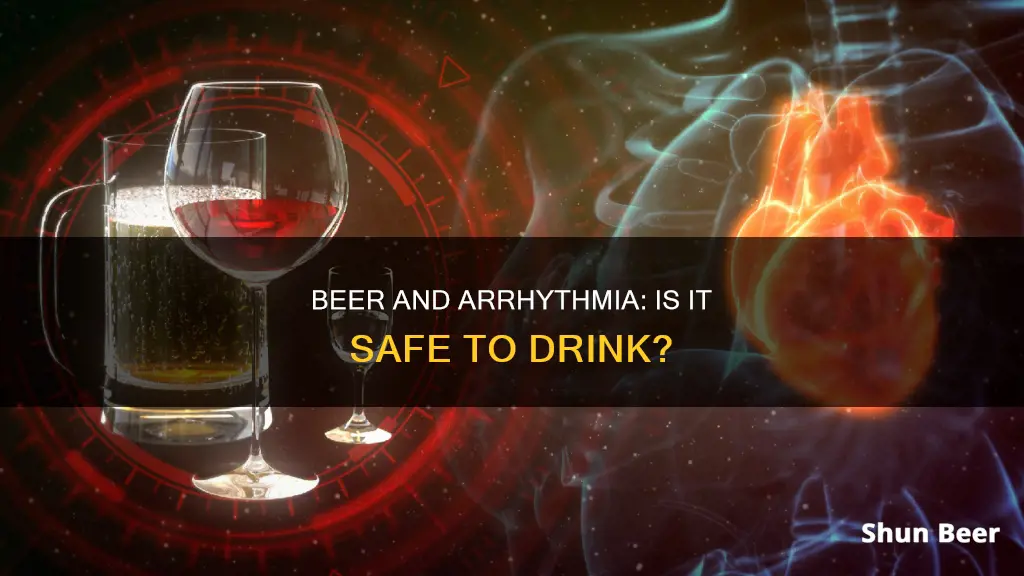
Drinking alcohol is a well-known risk factor for heart problems, and it is linked to an increased risk of arrhythmia. Even small amounts of alcohol, such as a single drink per day, can lead to a higher chance of developing arrhythmia. For those already suffering from arrhythmia, alcohol can trigger symptoms such as heart palpitations. While moderate drinking may be acceptable for some, it is essential for individuals with arrhythmia to understand their limits and avoid excessive consumption, as it can have detrimental effects on their health.
| Characteristics | Values |
|---|---|
| Drinking beer with arrhythmia | Not recommended due to increased risk of atrial fibrillation |
| Atrial fibrillation | A condition where the heart beats in an abnormal rhythm |
| Risk factors | Heavy drinking, age, diabetes, high blood pressure, heart disease |
| Effects of alcohol on atrial fibrillation | Heart palpitations, shortness of breath, fatigue, fainting or near fainting spells, disconcerting sensation of heart beating out of control |
| Recommended alcohol intake | No more than one standard alcoholic beverage a day for women and two for men |
What You'll Learn

The immediate effect of alcohol on atrial fibrillation
Alcohol has an immediate or near-immediate effect on heart rhythm, significantly increasing the chance of an episode of atrial fibrillation (AFib). Just one glass of wine, beer, or any other alcoholic drink increases the odds of an AFib episode within the next four hours by twofold. This risk increases with the amount of alcohol consumed. People who have two or more drinks in one sitting have a more than threefold higher chance of experiencing AFib.
The exact mechanism by which alcohol triggers AFib is not known. However, studies have shown that heavy drinking over a short period can trigger "holiday heart syndrome" in some people, and even small amounts of alcohol can trigger arrhythmia episodes in those with AFib.
A 2021 study published in the European Heart Journal found that compared to drinking no alcohol, consuming just one alcoholic drink a day was linked to a 16% increased risk of AFib over a median follow-up time of nearly 14 years. The study included 107,845 participants from Sweden, Norway, Finland, Denmark, and Italy, making it the largest study on alcohol consumption and long-term AFib incidence.
Another study presented at the American College of Cardiology's 70th Annual Scientific Session in 2021 is the first to track objective, real-time alcohol consumption and heart rhythm disturbance. The study found that every 0.1% increase in inferred blood alcohol concentration over the previous 12 hours was associated with an approximate 40% higher odds of an AFib episode. The study also showed that the total alcohol concentration over time predicted the chance of AFib occurring.
While there is no definitive answer on how much alcohol is safe for people with AFib to consume, health experts agree that heavy drinking and AFib don't mix. Alcohol can trigger symptoms of AFib such as heart palpitations. Research suggests that avoiding alcohol completely may be the best way to avoid the risk of AFib. However, moderate drinking may be okay for some people with AFib, but it is important to monitor your response to alcohol and adjust your consumption accordingly.
Champagne and Beer: A Perfect Pair?
You may want to see also

The recommended alcohol intake for women and men
Drinking alcohol, even in small amounts, has been linked to an increased risk of atrial fibrillation, a condition where the heart beats in an abnormal rhythm. This can lead to heart failure, stroke and dementia if untreated. Research has shown that alcohol can trigger symptoms of the condition, such as heart palpitations.
The Chief Medical Officers' guidelines for both men and women recommend that to keep health risks from alcohol at a low level, it is safest not to drink more than 14 units a week on a regular basis. This is roughly equivalent to six alcoholic drinks (or less than one and a half bottles of wine) a week. If you do drink as much as 14 units per week, it is best to spread this evenly over three or more days.
Drinking more than 14 units a week increases the risk of developing cancers of the mouth, throat and breast, as well as causing damage to the nervous system. The likelihood of alcohol damaging your health depends on how much you drink. The less you drink, the lower the health risks.
The general recommendation for daily alcohol consumption is no more than one standard alcoholic beverage a day for women and no more than two for men.
Workplace Attire: Beer Shirts, Appropriate or Not?
You may want to see also

The impact of binge drinking on heart health
Binge drinking is commonly defined as consuming eight or more drinks for women and ten or more drinks for men per day. It is well known that binge drinking is harmful to overall health, but its effects on the heart are particularly detrimental.
Binge drinking can trigger the nervous system to overstimulate the heart, leading to an increased risk of developing an irregular heartbeat or atrial fibrillation (Afib). This is known as "holiday heart syndrome", a well-established risk factor for atrial fibrillation. Even a single alcoholic drink has been associated with a twofold greater chance of an Afib episode within the next four hours. The risk increases with the number of drinks consumed, with two or more drinks leading to a more than threefold higher chance of Afib.
Binge drinking is also associated with an increased risk of other heart conditions. It can lead to high blood pressure, heart failure, stroke, and cardiomyopathy, a disorder affecting the heart muscle. Additionally, excessive alcohol intake can contribute to obesity and related health issues, further increasing the risk of heart disease.
While light to moderate alcohol consumption may have some potential benefits for heart health, such as raising levels of "good" HDL cholesterol, the negative effects of binge drinking far outweigh any potential benefits. It is important to note that the definition of "moderate" drinking is an average of one drink per day for women and one to two drinks per day for men.
In conclusion, binge drinking has a significant negative impact on heart health. It increases the risk of atrial fibrillation and other heart conditions, and can also contribute to obesity and related health issues. Therefore, it is crucial to stick to moderate levels of alcohol consumption and avoid binge drinking to maintain a healthy heart.
Gun Owners and Alcohol: Drinking and Carrying a Firearm
You may want to see also

Alcohol's effect on the nervous system
Alcohol is a central nervous system depressant. This means that it is a drug that slows down brain activity. It can change your mood, behaviour, and self-control. It can also cause problems with memory and clear thinking.
Alcohol has both immediate and near-immediate effects on heart rhythm, significantly increasing the chance that an episode of atrial fibrillation will occur. Research shows that drinking alcohol may put a person at greater risk of developing atrial fibrillation in the first place. One study found that, compared to drinking no alcohol at all, just one alcoholic drink a day was linked to a 16% increased risk of atrial fibrillation over an average follow-up time of nearly 14 years.
The central nervous system (CNS) is the major target for the adverse effects of alcohol and extensively promotes the development of a significant number of neurological diseases such as stroke, brain tumours, multiple sclerosis, Alzheimer's disease, and amyotrophic lateral sclerosis. Excessive alcohol consumption causes severe neuro-immunological changes in the internal organs, including irreversible brain injury. It also reacts with the defence mechanism of the blood-brain barrier, leading to changes in the configuration of the tight junction of endothelial cells and white matter thickness of the brain.
Alcohol's impact on the nervous system varies from person to person, depending on factors such as family history, overall volume consumed, speed of consumption, frequency of drinking episodes, and physical and mental health.
The only reliable way to avoid severe, alcohol-related nervous system problems is to avoid drinking rapidly and in heavy amounts.
The Magic Behind Beer Filtration: Using Sheet Filters
You may want to see also

Alcohol abstinence and its potential benefits
Alcohol abstinence refers to refraining from consuming alcoholic beverages. While moderate alcohol consumption is often associated with potential health benefits, such as a reduced risk of cardiovascular disease, abstaining from alcohol can offer several advantages, especially for individuals with arrhythmia or atrial fibrillation (Afib).
Reduced Risk of Atrial Fibrillation
Atrial fibrillation is a heart condition characterized by an irregular heartbeat. Research has found a strong link between alcohol consumption and the risk of developing Afib. Even small amounts of alcohol can increase the chances of experiencing Afib. A single drink per day, such as a small beer, is associated with a 16% higher risk of developing Afib compared to not drinking at all. Abstaining from alcohol can help lower this risk and reduce the likelihood of experiencing heart rhythm disturbances.
Improved Heart Health
Excessive alcohol consumption is known to have detrimental effects on heart health. It can lead to electrical and structural remodelling in the heart, causing scarring and electrical signalling problems in the atria. Abstaining from alcohol can help prevent these negative effects and improve overall heart health.
Reduced Risk of Other Health Issues
Alcohol consumption is linked to various health threats beyond atrial fibrillation. These include car accidents, violence, high blood pressure, and an increased risk of certain cancers. Abstaining from alcohol can help mitigate these risks and improve overall health and well-being.
Better Management of Arrhythmia Symptoms
For individuals who already have atrial fibrillation, alcohol can act as a trigger for symptoms such as heart palpitations. Abstaining from alcohol can help prevent these symptoms from occurring and improve the management of Afib.
Improved Quality of Life
Alcohol abstinence can lead to an improved quality of life, as individuals can avoid the negative consequences of alcohol on their physical and mental health. This includes reducing the risk of alcohol-related accidents, improving sleep quality, and enhancing overall well-being.
While moderate alcohol consumption may offer some benefits, alcohol abstinence is particularly beneficial for individuals with arrhythmia or those at risk of developing atrial fibrillation. It can help reduce the risk of Afib, improve heart health, lower the chances of other health issues, and lead to better management of Afib symptoms, ultimately contributing to a higher quality of life.
The Science Behind Beer: Brewing Chemistry Explained
You may want to see also
Frequently asked questions
It is not recommended to drink beer or any other alcoholic beverage if you have arrhythmia, as alcohol can trigger symptoms of the condition, such as heart palpitations. Research shows that drinking alcohol may put a person at greater risk of developing arrhythmia in the first place.
There are no specific guidelines on how much alcohol is safe to drink if you have arrhythmia. However, health experts agree that heavy drinking and arrhythmia don't mix. Moderate drinking, defined as no more than one drink per day for women and no more than two drinks per day for men, may be okay for some people with arrhythmia, but for others, even one drink may be too much.
Drinking alcohol can significantly increase the chance of an arrhythmia episode occurring within a few hours. The more alcohol consumed, the higher the risk. Alcohol can trigger symptoms such as severe shortness of breath, fatigue, fainting or near-fainting spells, and a sensation that the heart is beating out of control. Over time, arrhythmia can lead to heart failure, stroke, and dementia if untreated.







